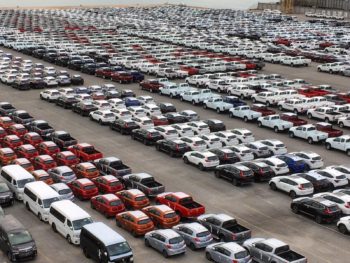New car market to face more significant challenges, predicts Cox Automotive
The new car market is to be hit by further significant challenges over the coming months, on top of the existing semiconductor issues.

Cox Automotive says the true impact of Brexit is yet to be felt while the switch to online buying will also bring impacts
Latest SMMT figures already show market recovery continues to be hampered by the global chip shortage – when compared with the previous decade average, June new car registrations were down 16.4%.
And according to Cox Automotive, the global semiconductor shortage is not the only factor affecting new car sales, with several headwinds yet to be felt fully across the new vehicle supply chain.
Philip Nothard, insight and strategy director at Cox Automotive, explained: “For instance, the true impact of Brexit is yet to be felt.
“The automotive industry within the UK and globally is having to change and rethink distribution strategies. This can lead to a delay in the movement of goods into the UK. In addition, there are pending issues facing manufacturers because there will be new vehicle tariffs applied to new cars coming into the country when production does catch up.”
Nothard also said there are impacts from the planning or adaption of agency model strategies by vehicle manufacturers in the sales process of new cars.
“Consumers are increasingly buying online, which also extends to cars for those who decide not to follow the traditional sales process in dealerships. The pandemic has given manufacturers and dealers time to reflect on how they sell cars and the increasing ways that it can take place.”
And he pointed towards manufacturers’ electrification strategies having a profound impact on new vehicle registrations – the latest SMMT figures showed June’s best-selling new car was the electric Tesla Model 3.
“Manufacturers will be conscious of the imminent introduction of fines for those who breach Corporate Average Fuel Economy (CAFE) regulations – which will push traditional OEMs towards the EV market. In addition, we’re likely to see more EVs topping the vehicle registrations list in future, as many OEMs use raw material shortages to accelerate the transition away from ICE (internal combustion engine) to EV.”
Nothard believes new car supply pressures will continue to be felt into 2022 and, as such, will fuel the current used car price boom, pushing vehicle prices and demand up further.
“It’s a great time to be selling a used car as they will fetch higher prices, but not so much to buy one. Also, it’s also not great news for dealers operating within the current or expanding ULEZ areas in London. Trying to sell a non-compliant petrol or diesel car within this area will be more difficult.”
But he predicts that the situation will stabilise as winter arrives, furlough ends, and the economy opens – causing consumers to spend their money elsewhere.












